There aren’t many baby girl names more popular than girl names that start with M.
Of all the baby naming trends today, none are more heavily contested than number names.
Some parents use them as a way of “numbering” their large family, while others prefer to name their child after a number that has either personal, religious or familial meaning.
But let’s be honest — you either love them or hate them.
George Costanza, a fictional character played by Jason Alexander in “Seinfeld,” was one of the many who loved number names so much that he had plans of naming his future firstborn child Seven.
“It’s a beautiful name for a boy or a girl — especially a girl, or a boy,” Costanza says in Season 7, Episode 13, titled “The Seven.”
When Susan, his love interest, argues that Seven is a number, not a name, Costanza replies: “I know, it’s Mickey Mantle’s number. So, not only is it an all-around beautiful name, it is also a living tribute.”
Susan wasn’t on board, but former soccer player David Beckham and his wife, Victoria Beckham, were.
The iconic couple named their youngest daughter Harper Seven — a nod to the number Beckham wore at the start of his illustrious career.
The name Seven was also given to a character in “Married With Children” and “Star Trek: Voyager” — and was almost given to a character in “Blossom.”
“Blossom” creator Don Reo explained in a 2017 interview with People that he originally wanted to name Jenna von Oÿ’s character Seven after one of his real-life son’s school friends (a girl named Seven).
When asked if it would be okay to use her name in the show, Seven said no and Reo went with the name Six instead. Just like that, the character Six Dorothy LeMeure was born.
So, there you have it.
Number names for babies — though rare — aren’t that weird, after all. And if you’re still on the fence, maybe one of the number names listed below can help change your mind!
-1. Birdie
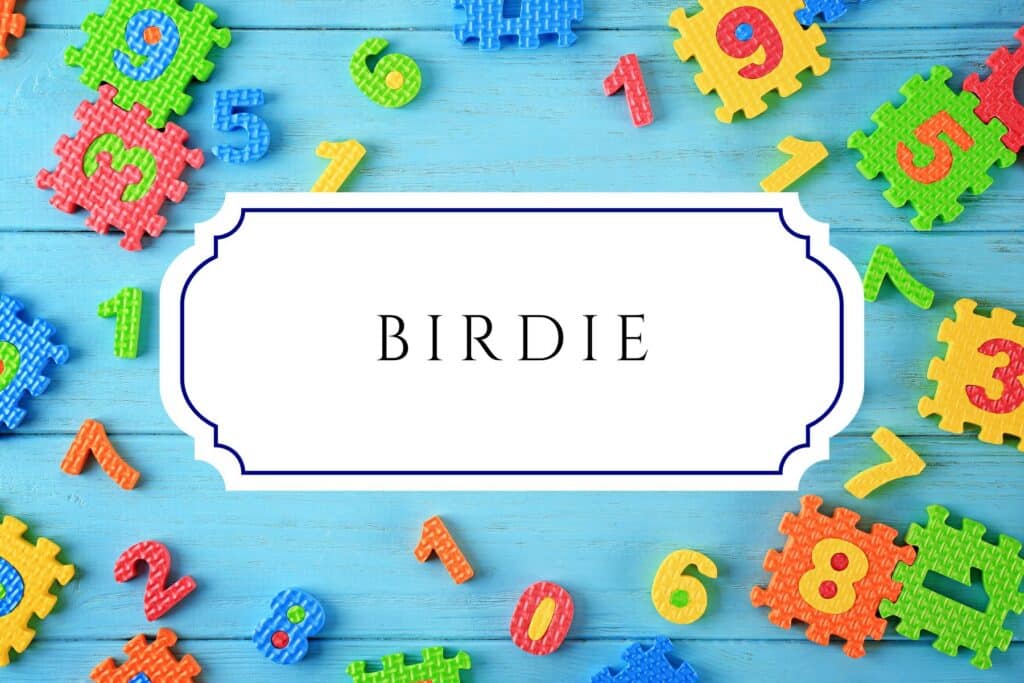
Origin: English
Meaning: Little Bird; One-under (Golf term)
Birdie, pronounced BUR-dee, is a diminutive form of baby names like Bertha and Bridget and is also an endearing word for a small bird. Numerically, Birdie is linked to golf, where a "birdie" represents scoring one stroke under par, making it a subtle reference to the number one.
0. Zero
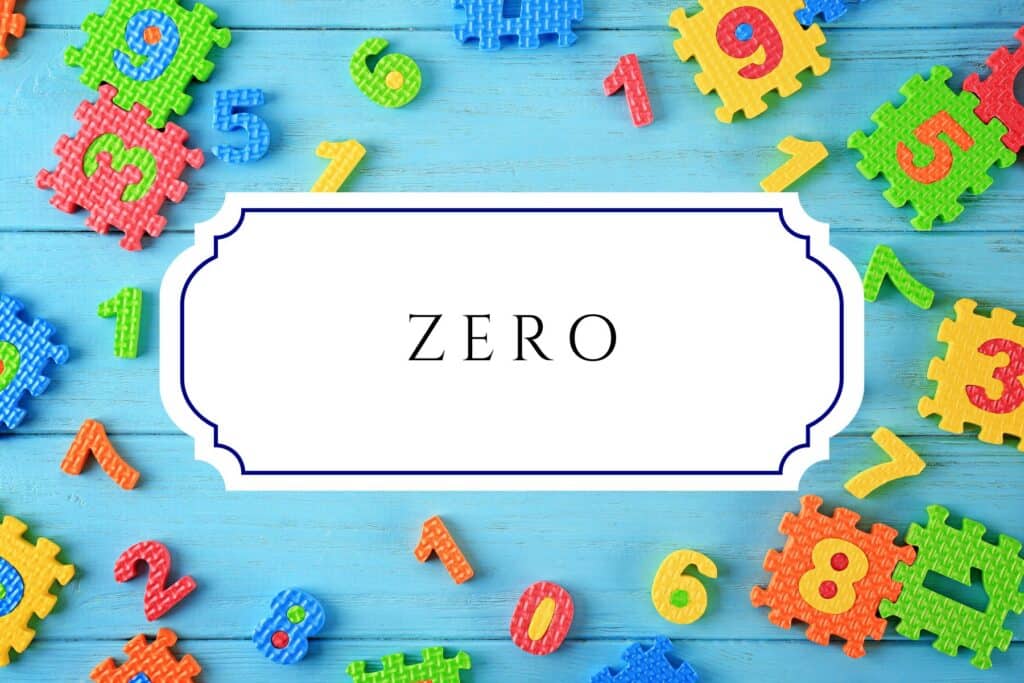
Origin: Latin; French
Meaning: Naught; Empty; 0
Zero, pronounced zee-ROW, comes from the French word zéro and Latin word zephirum, referring to the arithmetical symbol 0 or denoting the absence of all magnitude or quantity.
0. Zeroni
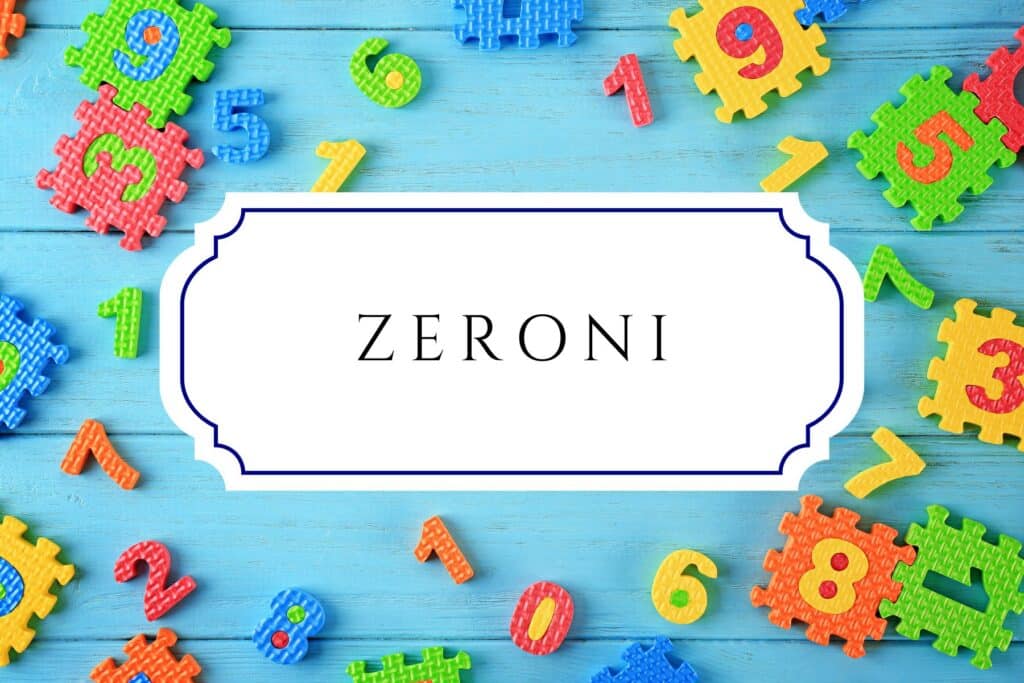
Origin: English; Modern
Meaning: Little Zero; Empty
Zeroni, pronounced zeh-ROH-nee, is a modern and creative extension of the name Zero that was influenced by Hector Zeroni and Madame Zeroni, two major characters in the 2003 film “Holes.”
0. Love

Origin: Old English
Meaning: Affection; 0 (Tennis term)
Love, pronounced LUHV, originates from the Old English word lufu, meaning affection or deep care. In numerical terms, "love" is famously used in tennis to represent a score of zero, possibly derived from the French phrase l'œuf ("the egg"), likening the shape of zero to an egg.
½. Demi

Origin: French
Meaning: Half; 0.5
Demi, pronounced DEH-mee, is derived from the French word demi, meaning “half.” Often associated with half-measures or partiality, Demi is linked to numerical concepts as it signifies a division into two equal parts (0.5).
1. Una

Origin: Latin
Meaning: One; Unity; 1
Una, pronounced OO-nah or YOU-nah, stems from the Latin una, meaning "one" or "unified." As a direct reference to the number one, Una symbolizes singularity, uniqueness and wholeness.
1. Prima
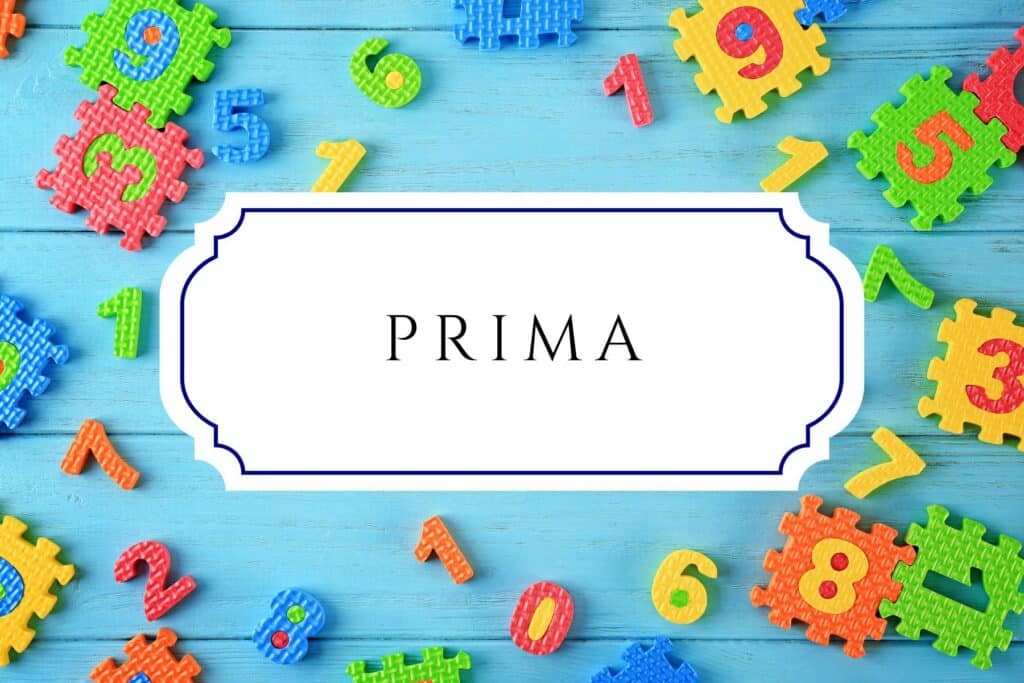
Origin: Italian
Meaning: First; Foremost
Prima, pronounced PREE-mah, comes from the Italian word prima, meaning "before" or "first.” It directly references being the first in order, rank or importance, making it the perfect name for a firstborn child.
1. Primus
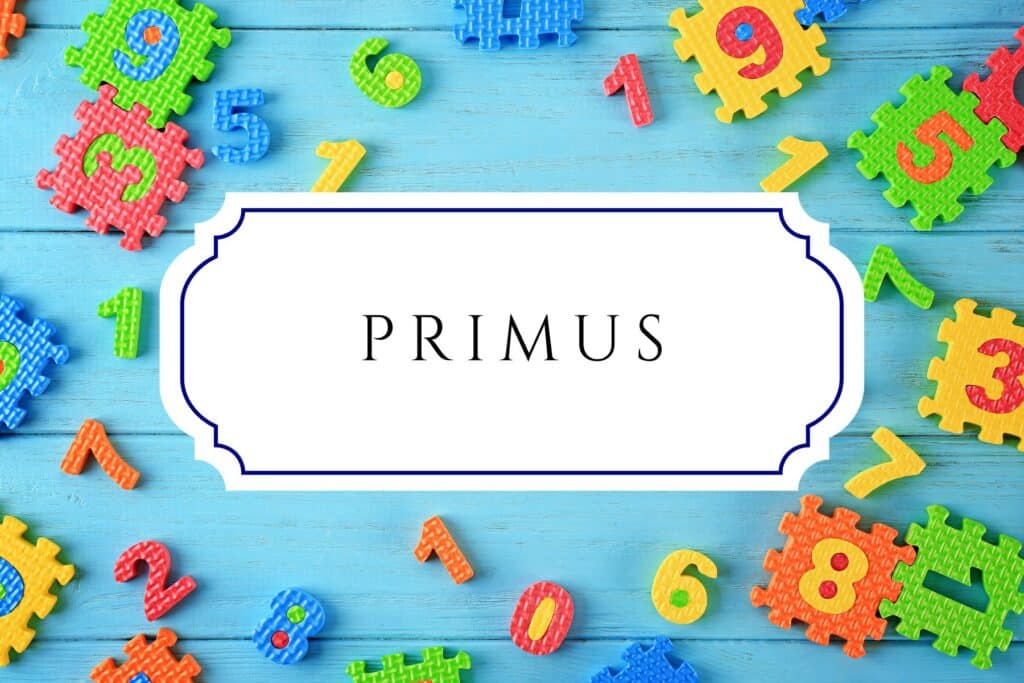
Origin: Latin
Meaning: First; Primary
Primus, pronounced PRY-muss or PREE-miss, originates from the Latin word primus, meaning "first" or "foremost." Traditionally used as a title for firstborn sons or leaders, Primus conveys a sense of distinction and precedence.
1. Ace
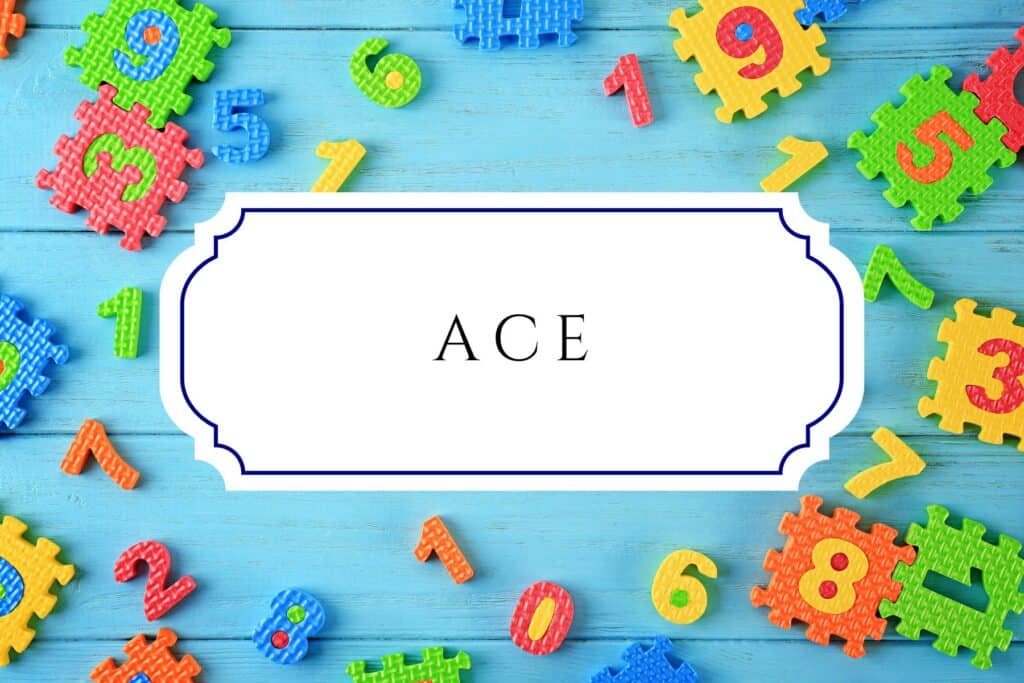
Origin: Latin; English
Meaning: One; Expert; No. 1
Ace, pronounced AYS, comes from the Latin word as, meaning "unit" or "one," and has been used in English to refer to the highest card in a deck or a person of first or high rank or quality.
1. Golden

Origin: English
Meaning: Made of Gold; First-place winner
Golden, pronounced GOHL-den, derives from the Old English gylden, meaning “made of gold.” As a number name, it can refer to the gold medal, which is traditionally given to the first place winner.
1. Winona

Origin: Native American (Dakota)
Meaning: Firstborn daughter; One
Winona, pronounced wih-NO-nah, comes from the Dakota Sioux language, where it means “firstborn daughter.” It can also be an elaboration of the word win, referring to a first-place finisher.
1. Mona

Origin: Latin; Greek
Meaning: One; Alone; Sole; Single
Mona, pronounced MOH-nah, comes from the Greek word monos, meaning “alone, only, sole, or single,” or the Latin word monas, meaning “one” or “single entity.” It can also mean “noble” in Irish or “wishes” in Arabic.
1. Monica

Origin: Greek; Latin
Meaning: One; Alone; Sole; Single; Advisor
Monica, pronounced MAH-nih-kah, has debated origins, but it is often linked to the Greek word monos, meaning "alone, only, sole, or single." Other theories suggest that the name means “advisor,” from the Latin word moneo.
1. Ensi
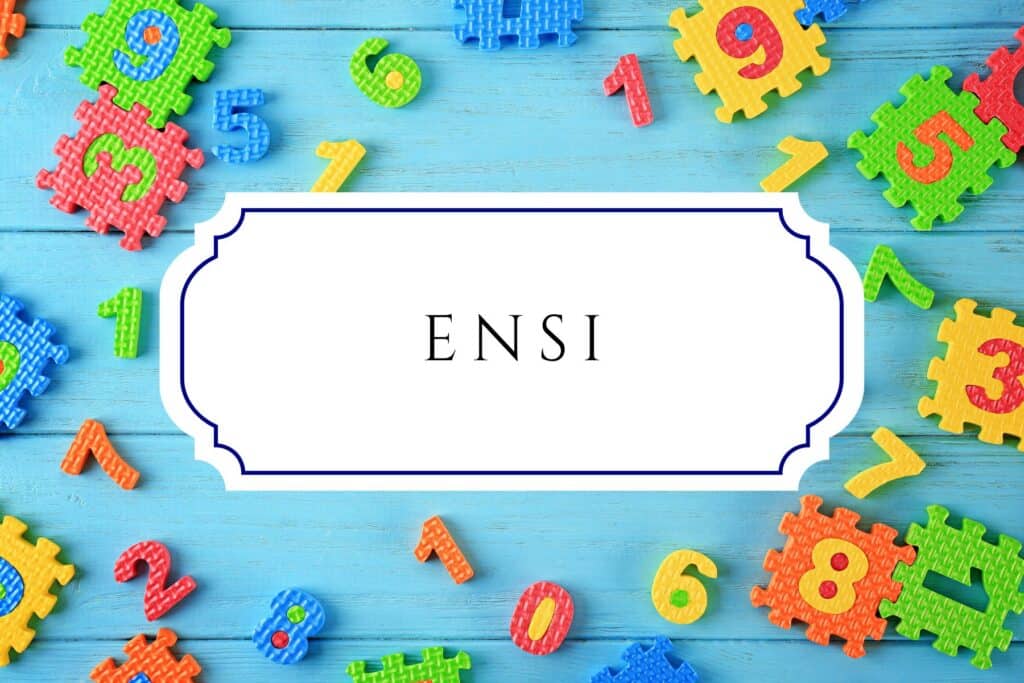
Origin: Finnish; Sumerian
Meaning: First; Initial; Ruler
Ensi, pronounced EN-see or EN-zee, has roots in Finnish, where it means "first" or "initial," and in ancient Sumerian, where it referred to a ruler or governor. This rare yet powerful name carries a strong connection to leadership and being first.
1. Hana

Origin: Korean
Meaning: One; Flower; Grace; Happiness
Hana, pronounced HAN-nah, is derived from the Korean word hana, meaning “one.” It can also mean “flower” in Japanese, “grace” in Hebrew (from Hannah) and “happiness” in Arabic.
1. Ichiro
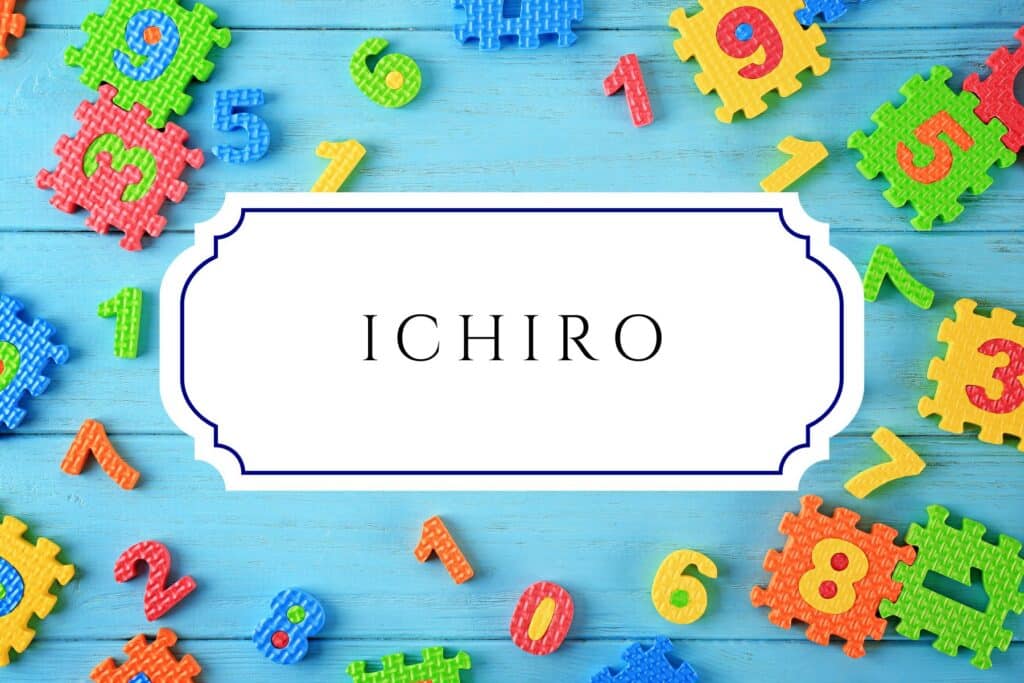
Origin: Japanese
Meaning: First Son; One
Ichiro, pronounced EE-chee-roh, is a traditional Japanese name derived from ichi (one) and ro (son), meaning "firstborn son." It’s often given to the eldest son in Japanese families, and was popularized by Hall of Fame baseball player Ichiro Suzuki.
1. Primrose
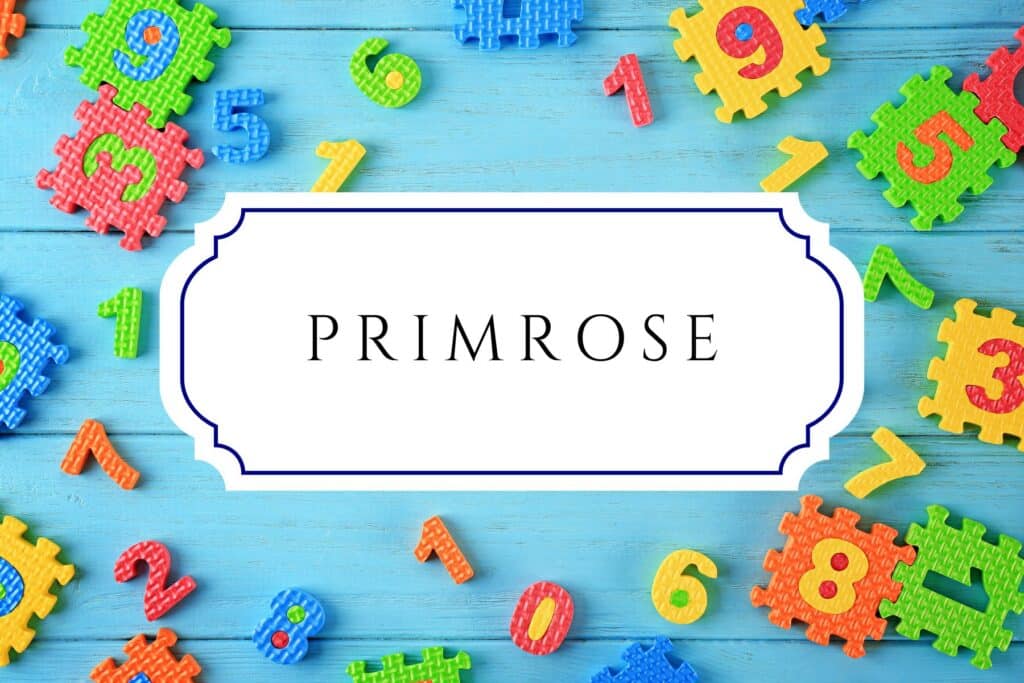
Origin: Latin
Meaning: First Rose; Early Spring
Primrose, pronounced PRIM-rohz, comes from the Latin prima rosa, meaning "first rose." This elegant floral name represents the first bloom of spring, making it closely tied to beginnings and the number one.
1. Kensa

Origin: Cornish
Meaning: First; Primary
Kensa, pronounced KEN-sah, originates from the Cornish word kensa, meaning "first." Traditionally given to firstborn daughters in Cornwall, Kensa embodies uniqueness, leadership and maturity.
2. Twain
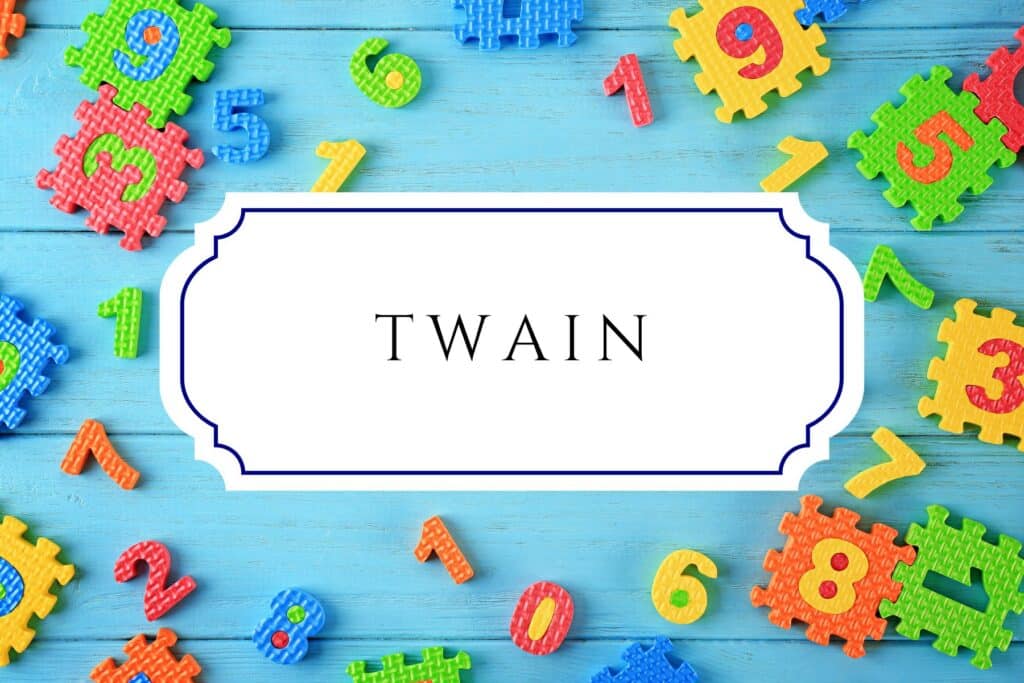
Origin: Old English
Meaning: Two; Pair
Twain, pronounced TWAYN, is derived from the Old English word twain, meaning “two” or “a pair.” It is most famously associated with the author Mark Twain, whose pen name comes from a term used in river boating, meaning a measurement of two fathoms (a depth of water).
2. Gemini
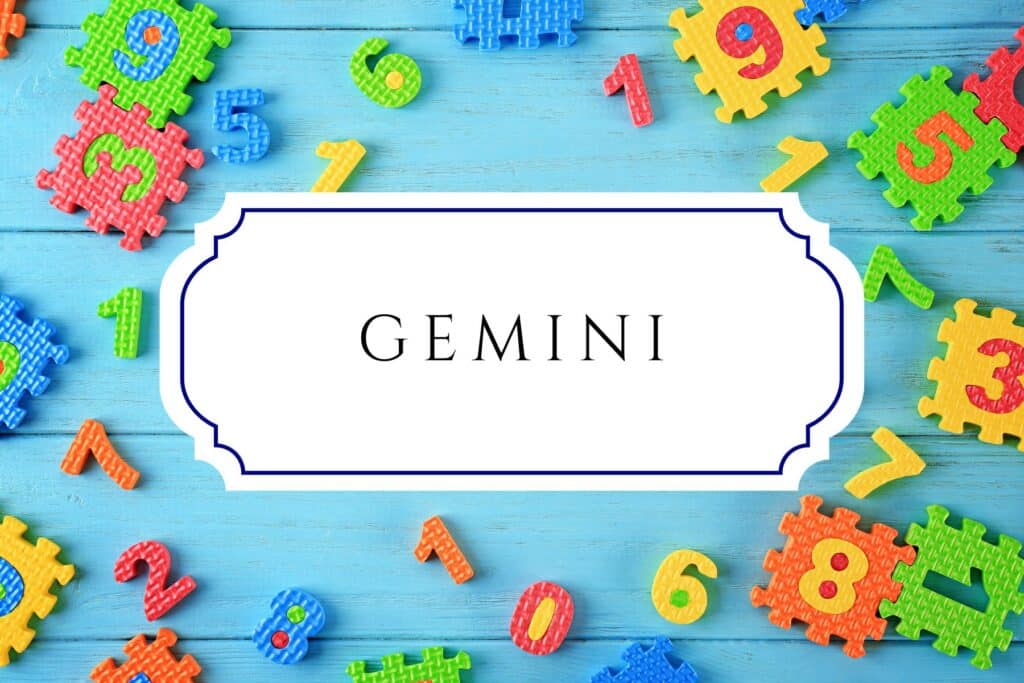
Origin: Latin
Meaning: Twins; Two
Gemini, pronounced JEM-uh-nai, comes from the Latin word gemini, meaning “twins.” It’s also the third sign of the zodiac, which is depicted by the twins Castor and Pollux, and its zodiac symbol is the Roman numeral for the number two.
2. Secundus
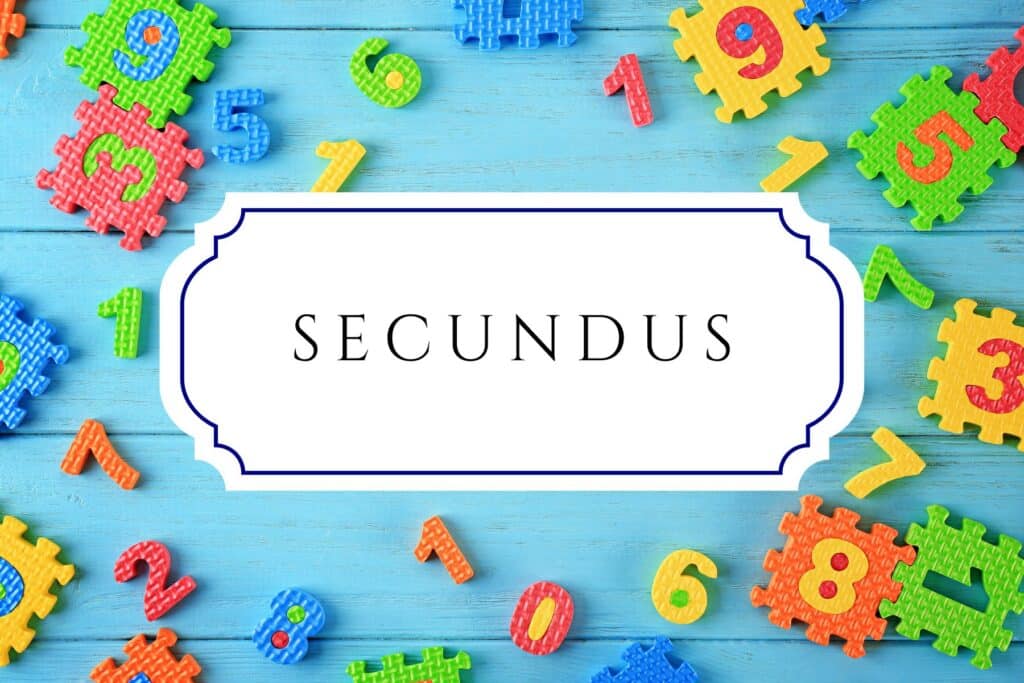
Origin: Latin
Meaning: Second; Following
Secundus, pronounced seh-KOON-dus, is derived from the Latin word secundus, meaning "second" or "following." Historically, it was used as a given name for second-born children or those in second position.
2. Duo
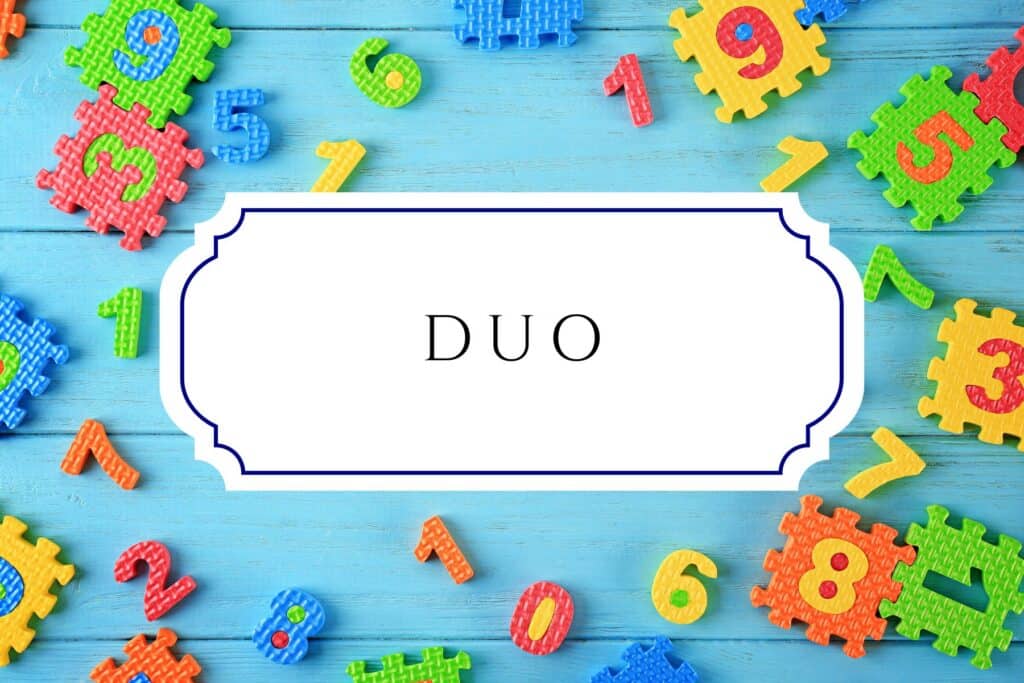
Origin: Latin
Meaning: Two; Pair
Duo, pronounced DOO-oh, comes from the Latin word duo, which simply means "two." This name is directly tied to the number two and often evokes ideas of balance, partnership, and symmetry.
2. Deuce
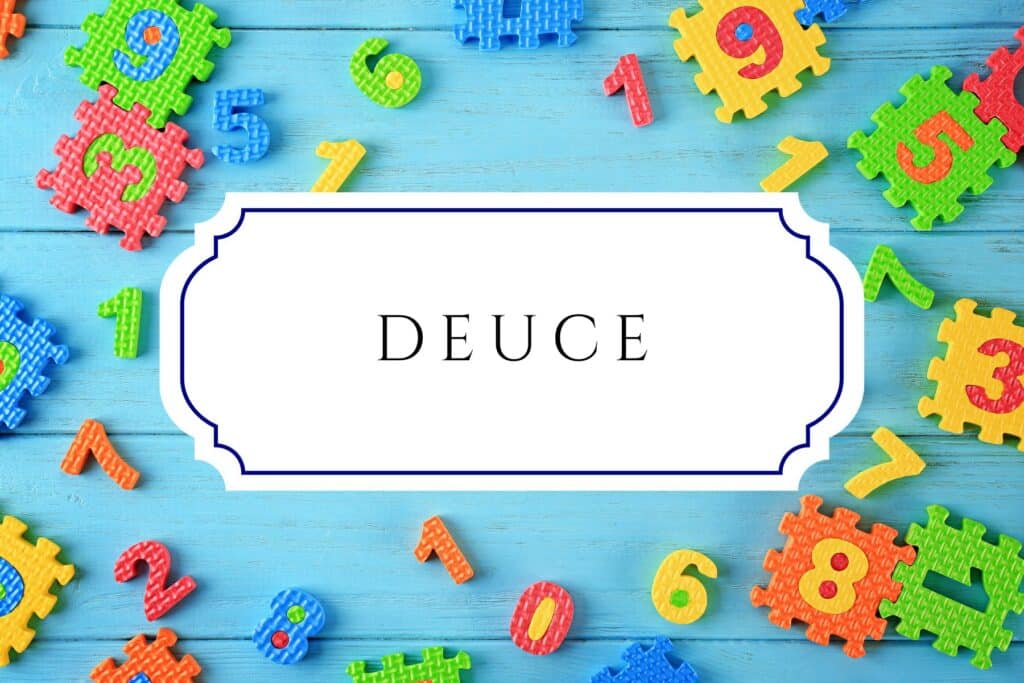
Origin: French; English
Meaning: Two; Double; Tie
Deuce, pronounced DOOS, comes from the French word deux, meaning "two." In card games, it refers to the number two, and in tennis, a "deuce" indicates a tie score that requires extra points to break.
2. Anden

Origin: Danish
Meaning: Two; Second
Anden, pronounced AN-din, is derived from the Danish word anden, meaning “two.” It’s a unique name to give a second-born son and can also be given to the heir or successor of a family.
2. Zwei

Origin: German
Meaning: Two; 2
Zwei, pronounced ZVY, comes from the German word zwei, meaning "two.” Its direct relation to the number two and unisex nature makes it the perfect name for a second-born son or daughter.
2. Katherine
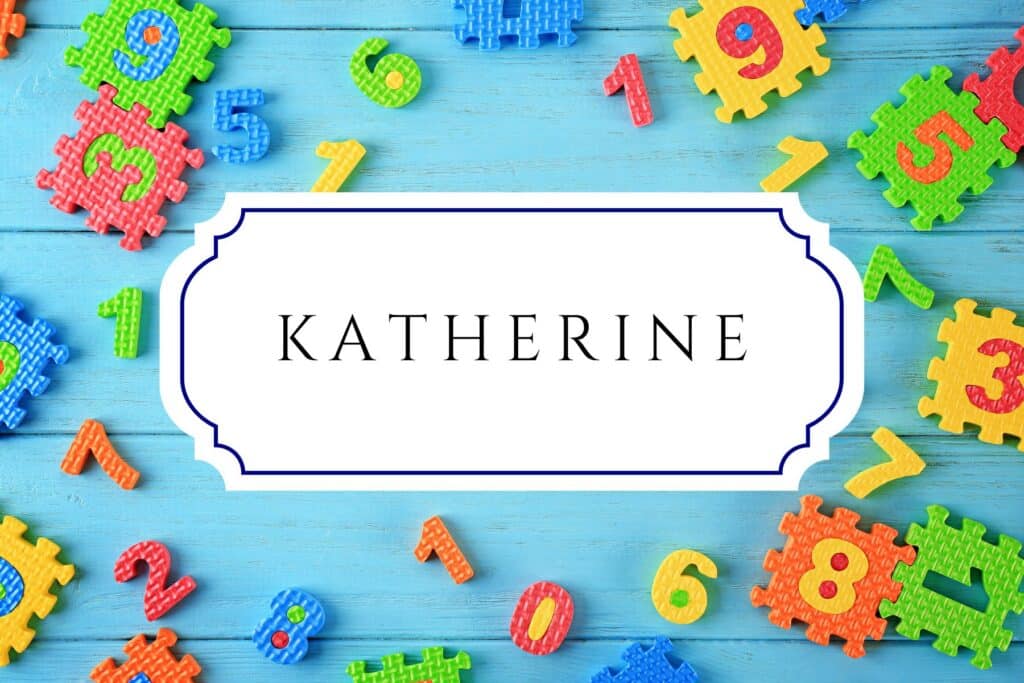
Origin: Greek
Meaning: Pure; Each of the Two
Katherine, pronounced KATH-er-in, has Greek origins from katharos, meaning "pure." While it isn't directly related to the number two, some theories suggest that it’s derived from the Greek word hekateros, meaning “each of the two.”
2. Thomas

Origin: Aramaic
Meaning: Twin; Two
Thomas, pronounced TAH-muss, comes from the Aramaic t’oma, meaning "twin." It directly references the number two, often used for twins or those born in pairs. It has been a top-100 boy’s name in the U.S. every year since 1900.
2. Sterling

Origin: English
Meaning: High-Quality; Excellent; Second-place finisher
Sterling, pronounced STUR-ling, originally referred to high-quality silver and is linked to purity and genuineness. While not directly related to the number two, a silver medal is often given to the second-place finisher in most competitions.
3. Trinity
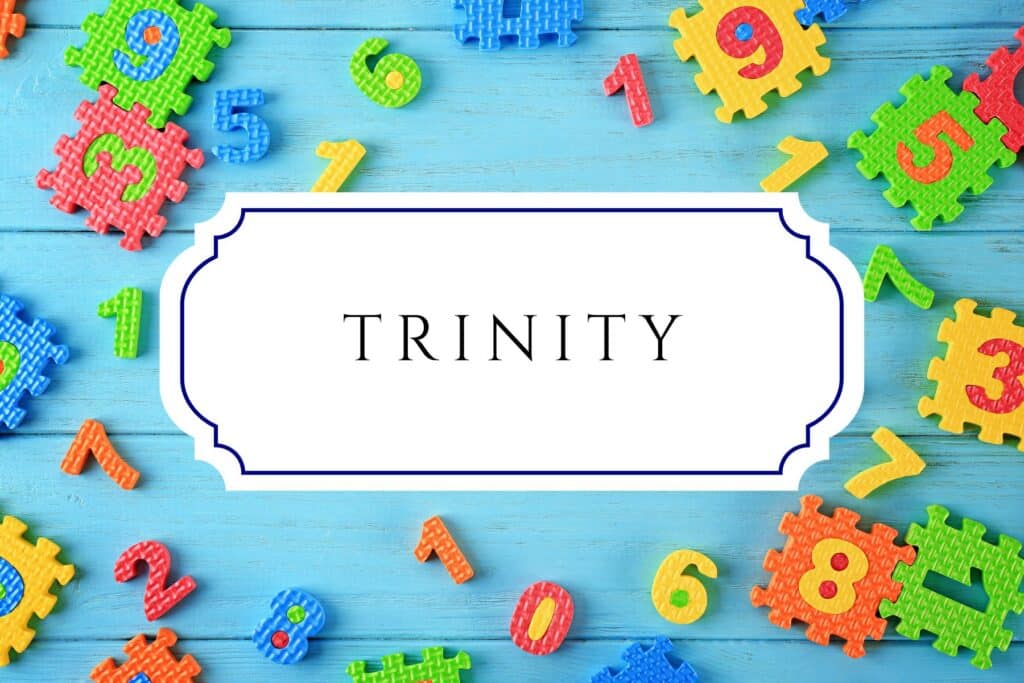
Origin: Latin
Meaning: Three; Triad; Holy Trinity
Trinity, pronounced TRIN-ih-tee, comes from the Latin trinitas and triad, meaning "three" or "the state of being three." It is most famously associated with the Christian concept of the Holy Trinity, referring to God as Father, Son, and Holy Spirit.
3. Trey
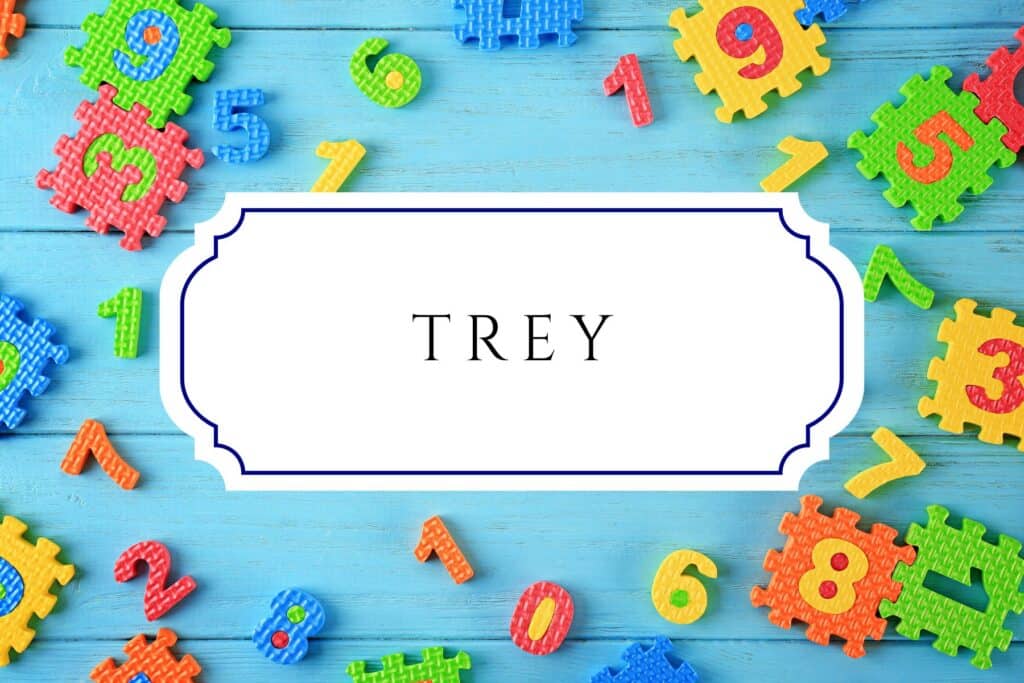
Origin: Old French; English
Meaning: Three; Third; Three-point shot
Trey, pronounced TRAY, is derived from the Old French word trois, meaning “three,” and is commonly used in the basketball world to refer to a three-point shot.
3. Marcheline
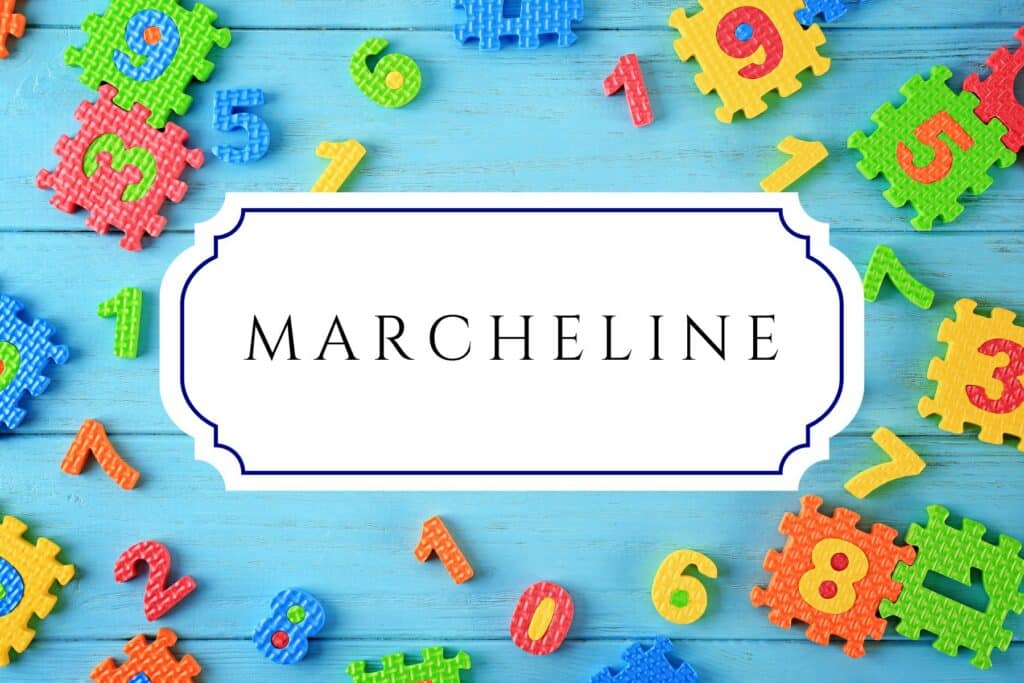
Origin: French; English
Meaning: Little Warrior; Third month (March)
Marcheline, pronounced MAR-shuh-leen, is a feminine form of the name Marcellus and Marcella, which derives from the Latin martius, meaning "warrior." In this case, it’s an elaboration of March, the third month in a calendar year.
3. Tertius
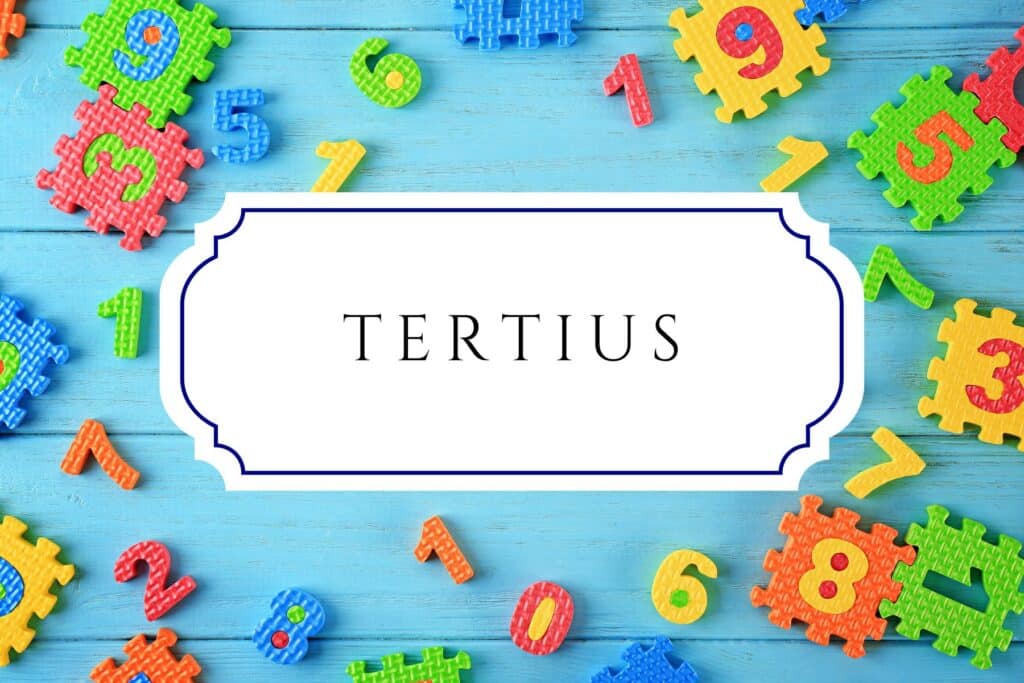
Origin: Latin
Meaning: Third; 3
Tertius, pronounced TER-shus, is a classical Latin name derived from the Latin word tertius, meaning "third." It was often used in ancient Rome for third-born children or children third in line to a throne.
3. Tripp

Origin: English
Meaning: Third; Triple; Triplet
Tripp, pronounced TRIP, is a modern English name that is often a diminutive or variation of the name Triplet, referring to the third-born in a set of triplets. It;s also used in basketball as a slang term for a “triple” or “three-point shot.”
3. Tertia

Origin: Latin
Meaning: Third; 3
Tertia, pronounced TUR-shuh, is the feminine form of Tertius and is derived from the Latin word tertius, meaning “third.” It was traditionally given to third-born daughters or someone third in line to a throne.
3. Tressa
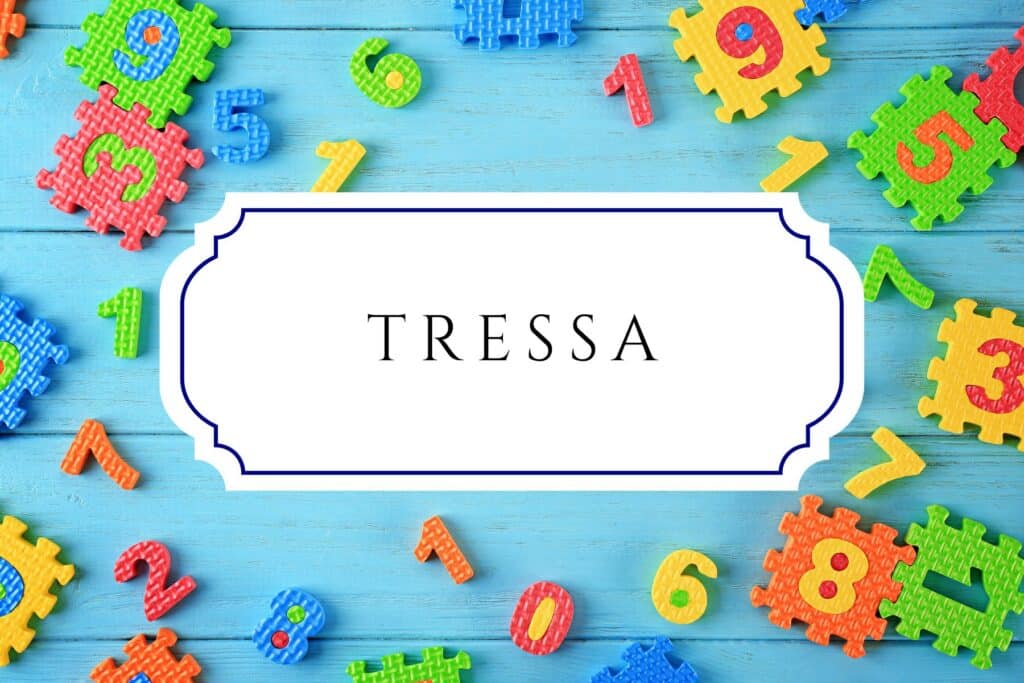
Origin: Cornish
Meaning: Third; 3rd
Tressa, pronounced TRESS-uh, is the ordinal number for three (third) in the Cornish language. It can also be a variation or nickname of Teresa, which means “harvester” or “summer” in Greek.
3. Bronze

Origin: English
Meaning: Metal Alloy; Third-place (bronze medal)
Bronze, pronounced BRAHNZ, is an English name derived from the metal known for its distinct color and strength. In the context of numbers, Bronze is often linked to the third-place medal in sports and competitions.
4. Ivy

Origin: English; Latin
Meaning: Climbing plant; IV; Four (4)
Ivy, pronounced EYE-vee, derives from the Old English word ifig, referring to the climbing evergreen plant. Its connection to the number four comes from its resemblance to the Roman numeral IV (4).
4. April

Origin: Latin
Meaning: To open; Fourth month of the year
April, pronounced AY-pril, comes from the Latin word "aperire" meaning "to open," referring to the opening or blossoming of flowers and trees in spring. As the fourth month in the modern calendar, April directly connects to the number four.
4. Delta

Origin: Greek
Meaning: Fourth letter; Triangle
Delta, pronounced DEL-tuh, derives from the fourth letter (Δ) of the Greek alphabet. The name comes from the Phoenician letter dalet, meaning "door," and represents the triangular shape of river deltas.
5. May

Origin: Latin
Meaning: Fifth month of the year; Growth; Increase
May, pronounced MAY, derives from the Latin word maius, named after the Roman goddess Maia who embodied growth and increase. As the fifth month in the modern calendar, May directly connects to the number five.
5. Quint

Origin: Latin
Meaning: Fifth; 5th
Quint, pronounced KWINT, comes from the Latin word quintus, meaning "fifth." This concise name directly represents the number five and was historically used to denote the fifth child born in a family.
5. Quintus

Origin: Latin
Meaning: Fifth; 5th
Quintus, pronounced KWIN-tus, derives from the Latin word quintus, meaning "fifth." It’s a classical Roman praenomen (first name) that was traditionally given to the fifth-born son in ancient Roman families.
5. Quintavius
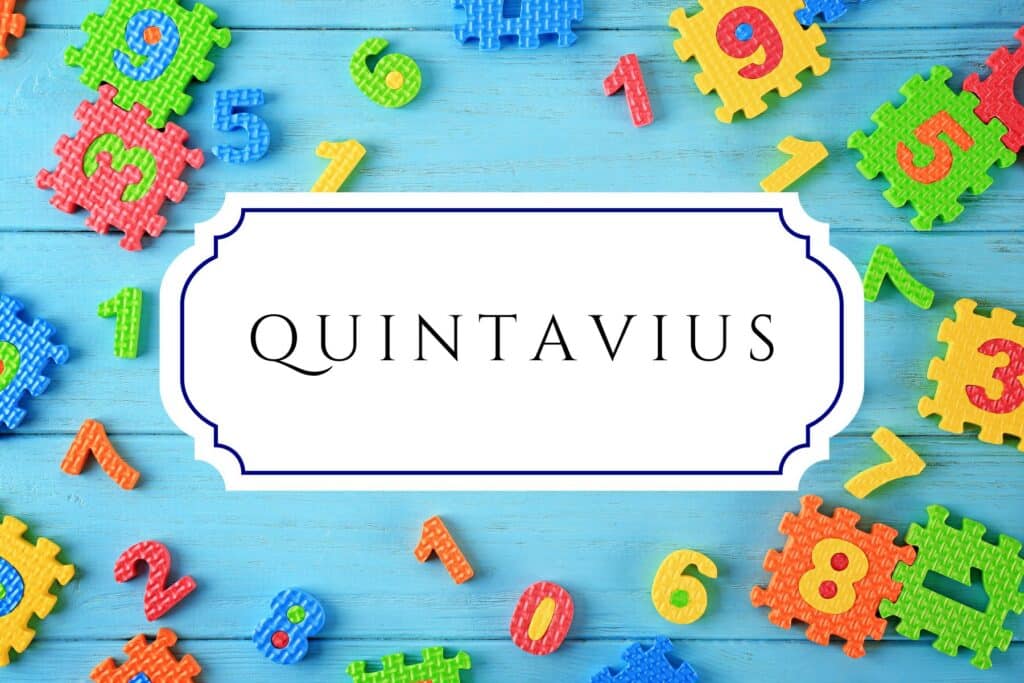
Origin: Latin
Meaning: Fifth; 5th
Quintavius, pronounced kwin-TAY-vee-us, is an elaborate derivative of the Latin word quintus, meaning "fifth." This ornate name expands on the basic numerical reference with additional syllables to create a more unique naming option.
5. Quincy

Origin: Latin
Meaning: Estate of the fifth; 5th
Quincy, pronounced KWIN-see, derives from the Latin word quintus, meaning “fifth,” combined with a place suffix, originally referring to "the fifth lord's estate." Popular in both English and French cultures, the name maintains its connection to the number five while having evolved into a surname.
5. Quinto

Origin: Latin; Spanish
Meaning: Fifth; 5th
Quinto, pronounced KEEN-toh, comes from the Latin word quintus and is particularly common among Spanish-speaking families. This variation directly means "fifth" and was traditionally given to the fifth child.
5. Quentin

Origin: Latin; French
Meaning: Fifth; 5th
Quentin, pronounced KWEN-tin, derives from the Latin word quintus, meaning "fifth." This French variation evolved from the original numerical meaning and gained popularity through St. Quentin, a 3rd-century Christian martyr.
5. Nick
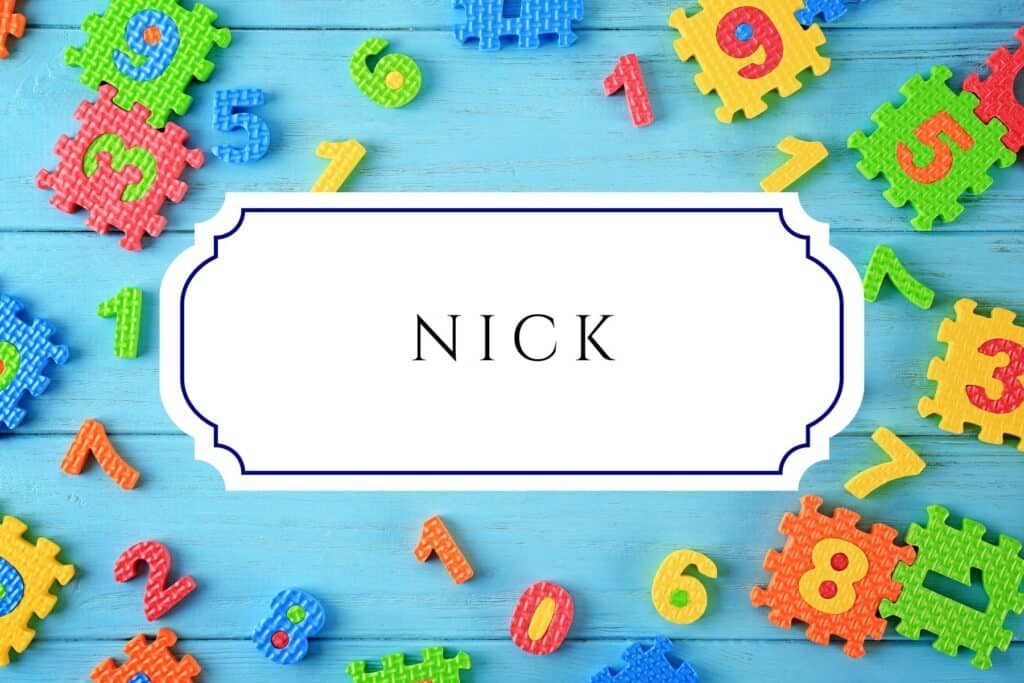
Origin: English; American
Meaning: Victory of the people; Five-cent coin
Nick, pronounced NIK, when related to the number five, references the "nickel" coin worth five cents in American currency. While Nick is more commonly a diminutive of Nicholas (meaning "victory of the people"), its association with the five-cent coin creates a subtle numerical connection.
5. Epsilon

Origin: Greek
Meaning: Fifth letter; 5th; Small quantity; Small error
Epsilon, pronounced EP-si-lon, represents the fifth letter (Ε, ε) of the Greek alphabet and is derived from the Phoenician letter "he.” It’s commonly used in mathematics and physics to represent an arbitrarily small quantity or a small error.
5. Pompeius
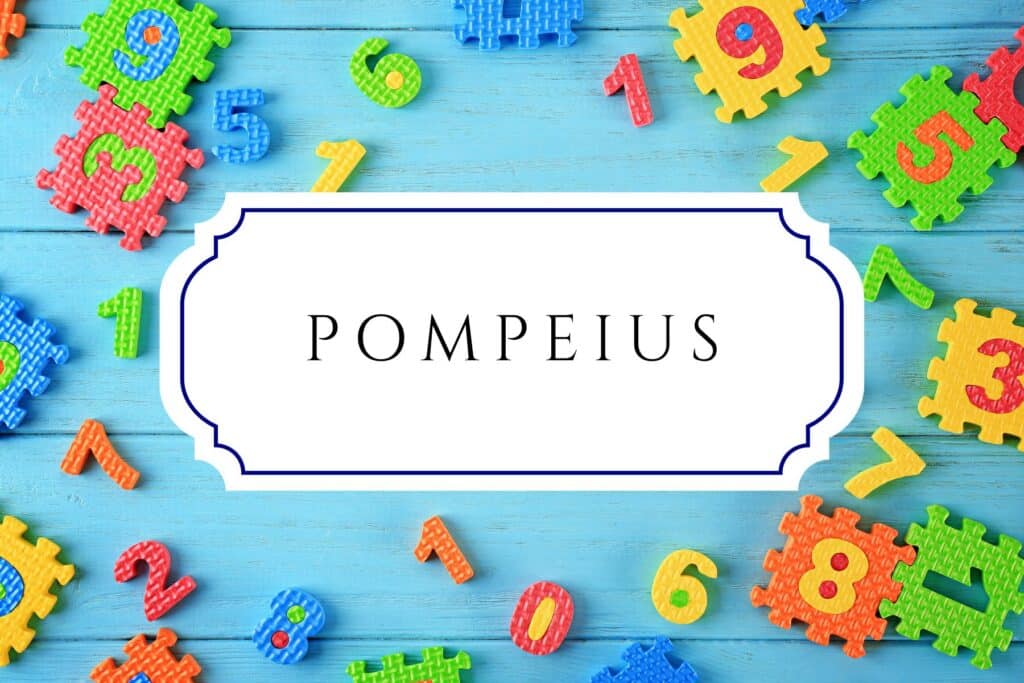
Origin: Latin, Roman
Meaning: Five; 5
Pompeius, pronounced pom-PAY-us, is a Roman family name associated with the famous general Pompey the Great. Its connection to five comes from its etymology, as some scholars suggest it derives from the Oscan word for "five."
5. Pompey

Origin: Latin, Roman
Meaning: Five; 5
Pompey, pronounced POM-pee, is derived from the Roman family name Pompeius, which some scholars believe has roots in the Oscan word for "five." It is most famously associated with the Roman general Pompey the Great (Gnaeus Pompeius Magnus).
6. Zeta
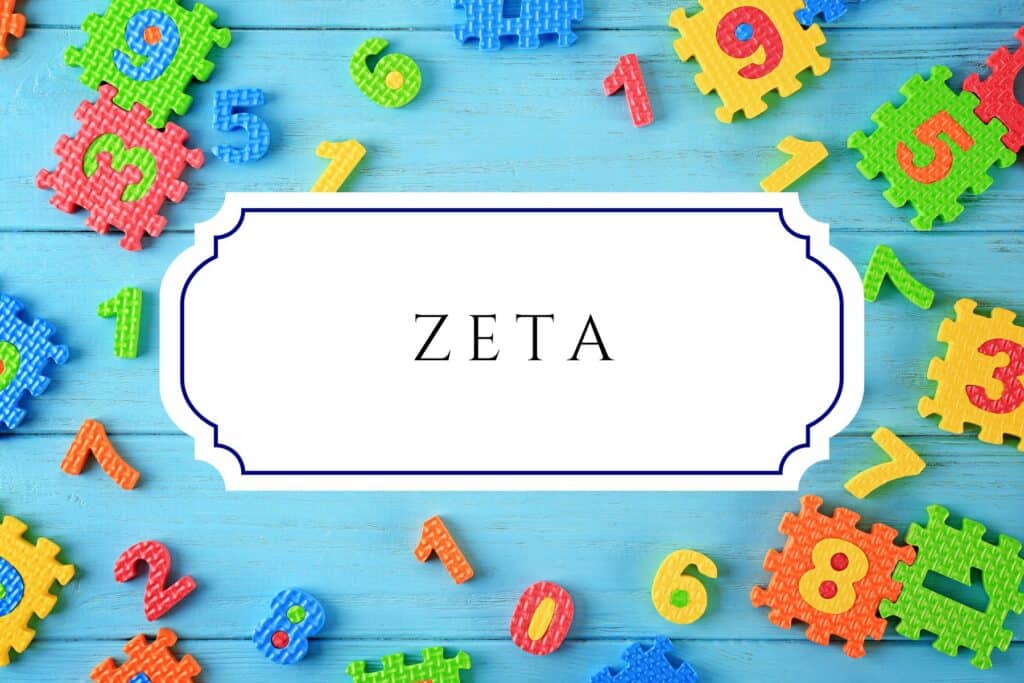
Origin: Greek
Meaning: Sixth letter; 6th
Zeta, pronounced ZAY-tuh, represents the sixth letter (Ζ, ζ) of the Greek alphabet and is derived from the Phoenician letter "zayin," meaning “sword” or “weapon.” It has maintained its position as the sixth character through centuries of linguistic evolution.
6. June

Origin: Latin
Meaning: Sixth month; 6th; Queen of the Roman gods
June, pronounced JOON, derives from the Latin word "Junius," which was possibly named after the Roman goddess Juno, protector of women and marriage. As the sixth month in the modern calendar, June directly connects to the number six.
6. Sextus

Origin: Latin
Meaning: Sixth, 6th
Sextus, pronounced SEKS-tus, comes from the Latin word for "sixth." This classical Roman praenomen (first name) was traditionally given to the sixth-born son in ancient Roman families.
7. Sevyn

Origin: English; Modern
Meaning: Seven; 7
Sevyn, pronounced SEV-in, is a contemporary variation on the English word "seven." The name Seven is fairly popular in pop culture, so replacing the second “e” with a “y” gives it a much more unique feel.
7. Septimus
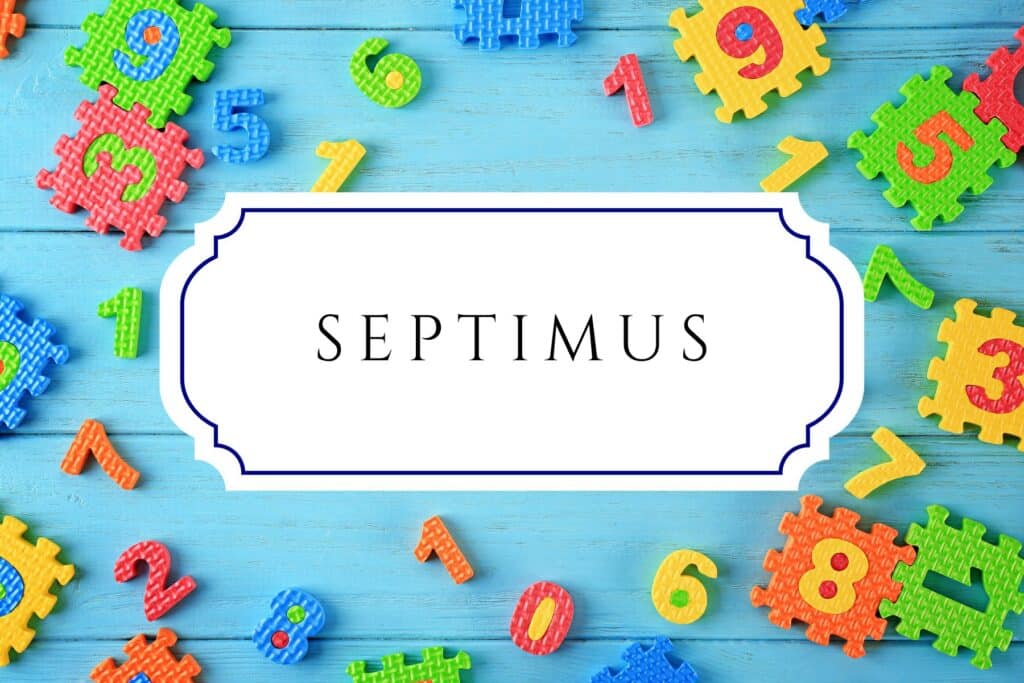
Origin: Latin
Meaning: Seventh; 7th
Septimus, pronounced SEP-ti-mus, derives from the Latin word for "seventh." This classical Roman name was traditionally given to the seventh-born child in ancient Roman families, but can also be given to a baby born on the 7th day of the month, or in the seventh month of the year (July).
7. Julian

Origin: Latin
Meaning: Seventh month; 7th; Youthful; Downy-bearded
Julian, pronounced JOO-lee-an, derives from the Latin "Julius," named after the Roman statesman Julius Caesar, for whom the seventh month July was renamed. While the name's primary meaning relates to being "youthful" or "downy-bearded," its connection to July creates an association with the number seven.
7. Julius

Origin: Latin
Meaning: Seventh month; 7th; Downy-bearded; Youthful
Julius, pronounced JOO-lee-us, is the Roman family name that gave rise to July, the seventh month in the modern calendar. Originally meaning "downy-bearded" or "youthful," the name gained prominence through Julius Caesar, after whom the month was renamed.
7. Neves
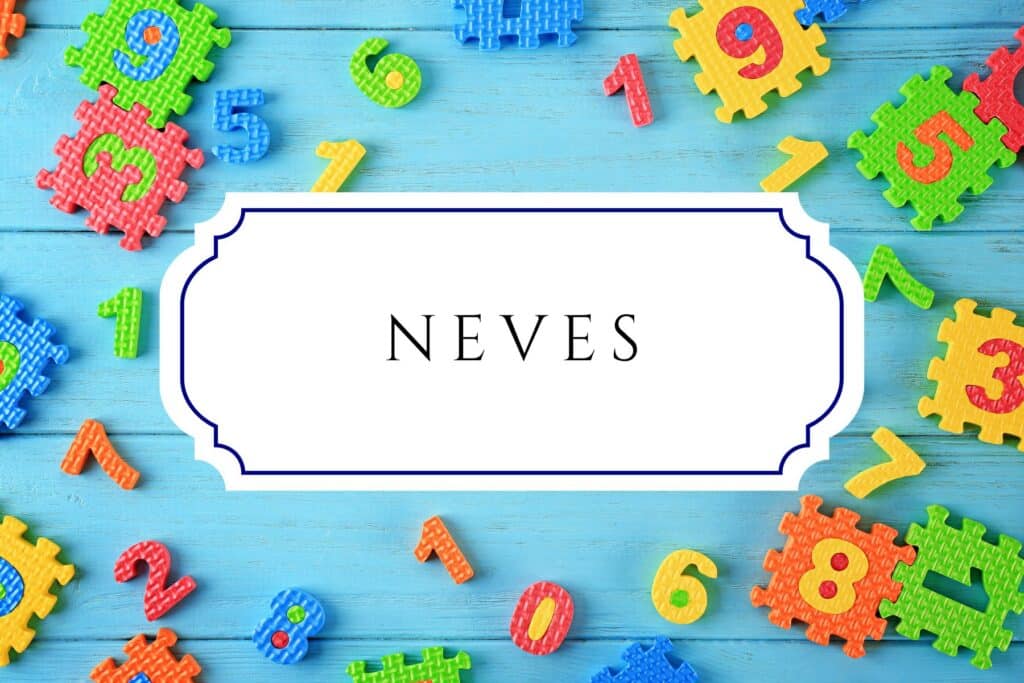
Origin: English, Modern
Meaning: Seven; 7
Neves, pronounced NEV-es, is simply the word "seven" spelled backwards. This creative reversal offers a unique twist on the numerical name while maintaining its direct connection to the number seven.
8. August

Origin: Latin
Meaning: Eighth month; 8th; Venerable; Great
August, pronounced AW-gust, derives from the Latin word "augustus" meaning "venerable" or "majestic." As the eighth month in the modern calendar, August directly connects to the number eight.
8. Augustus

Origin: Latin
Meaning: Eighth month; 8th; Venerable; Great
Augustus, pronounced aw-GUS-tus, comes from the Latin word meaning "venerable" or "majestic," and was the title given to the first Roman emperor. Its connection to the number eight stems from August being the eighth month, which was named in his honor.
8. Octavia

Origin: Latin
Meaning: Eighth; 8th
Octavia, pronounced ok-TAY-vee-ah, derives from the Latin word "octavus" meaning "eighth." This feminine name was traditionally given to the eighth-born child in Roman families, particularly to girls.
8. Octavius
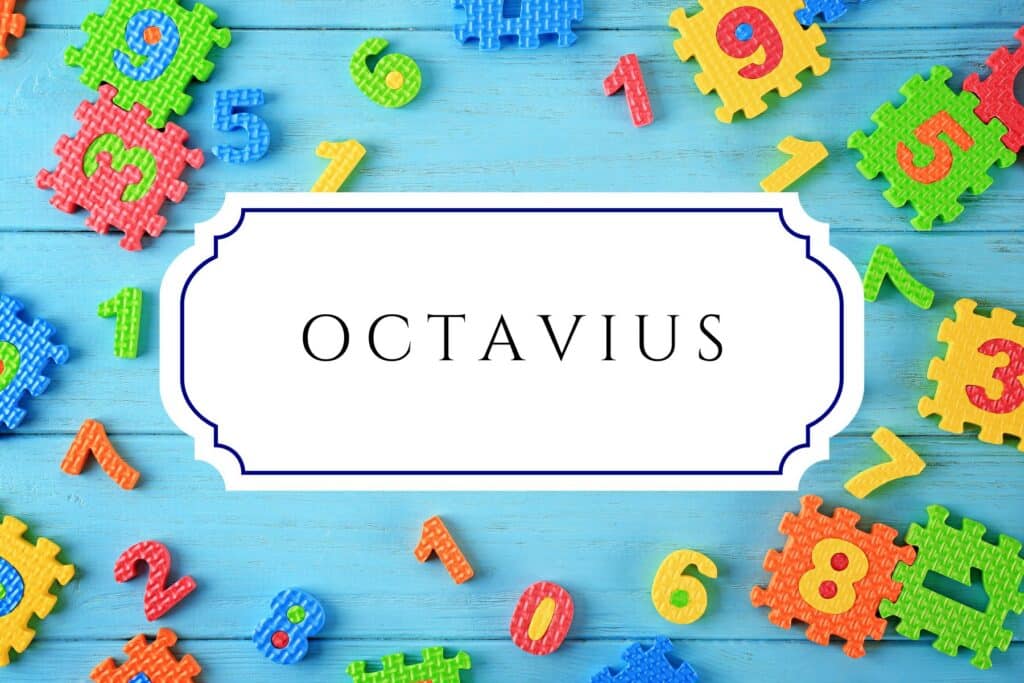
Origin: Latin
Meaning: Eighth, 8th
Octavius, pronounced ok-TAY-vee-us, comes from the Latin word "octavus" meaning "eighth." It’s the masculine equivalent to Octavia and was traditionally given to the eighth-born son in Roman families.
8. Octavian
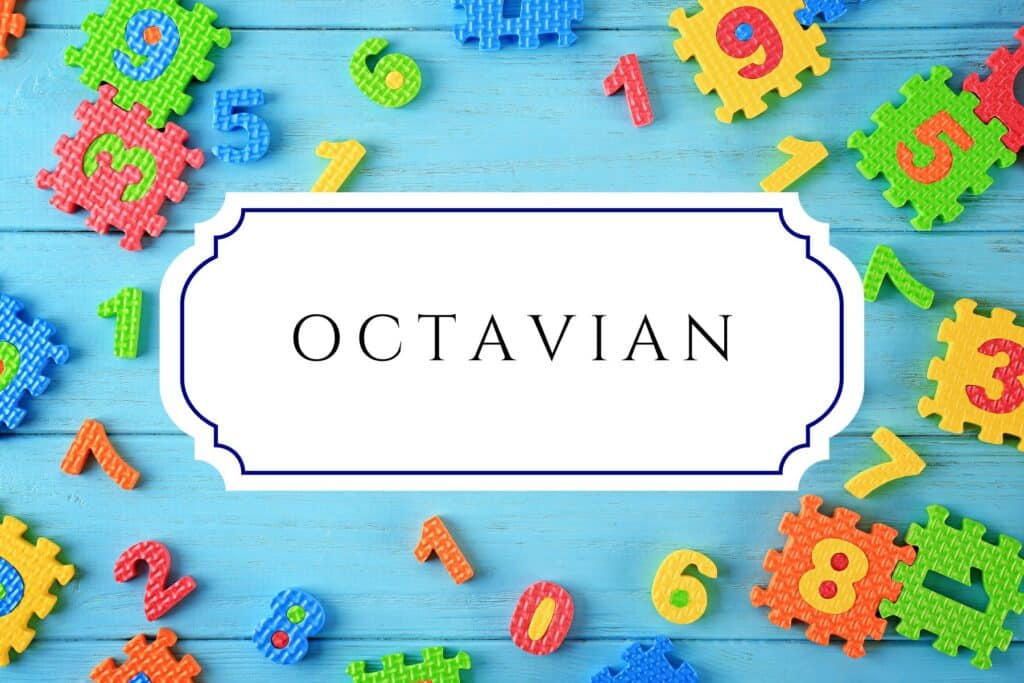
Origin: Latin
Meaning: Eighth; 8th
Octavian, pronounced ok-TAY-vee-an, is derived from the Roman family name Octavius, itself from the Latin word for "eighth." Most famously borne by Gaius Octavius who later became Emperor Augustus, the name maintained popularity through early Christian history.
8. Octavie

Origin: Latin, French
Meaning: Eighth; 8th
Octavie, pronounced ok-TAH-vee, is the French feminine form derived from the Latin "octavus" meaning "eighth." This variation offers a softer, more delicate sound while maintaining the direct connection to the number eight through its Latin etymology. It can also make for a cute nickname for Octavia.
8. Ottavio

Origin: Italian, Latin
Meaning: Eighth; 8th
Ottavio, pronounced oh-TAH-vee-oh, comes from the Italian word “ottavo,” meaning “eighth.” It’s the Italian form of the Latin name Octavius and was traditionally given to the eighth-born child in Italian families.
8. Ottavia

Origin: Italian, Latin
Meaning: Eighth; 8th
Ottavia, pronounced oh-TAH-vee-uh, is the feminine form of Ottavia, which is derived from the Italian word “ottavo,” meaning “eighth.” Italian families primarily use it on their eighth-born son or a son who was born on the eighth day of the month or eighth day of the year.
8. Otto
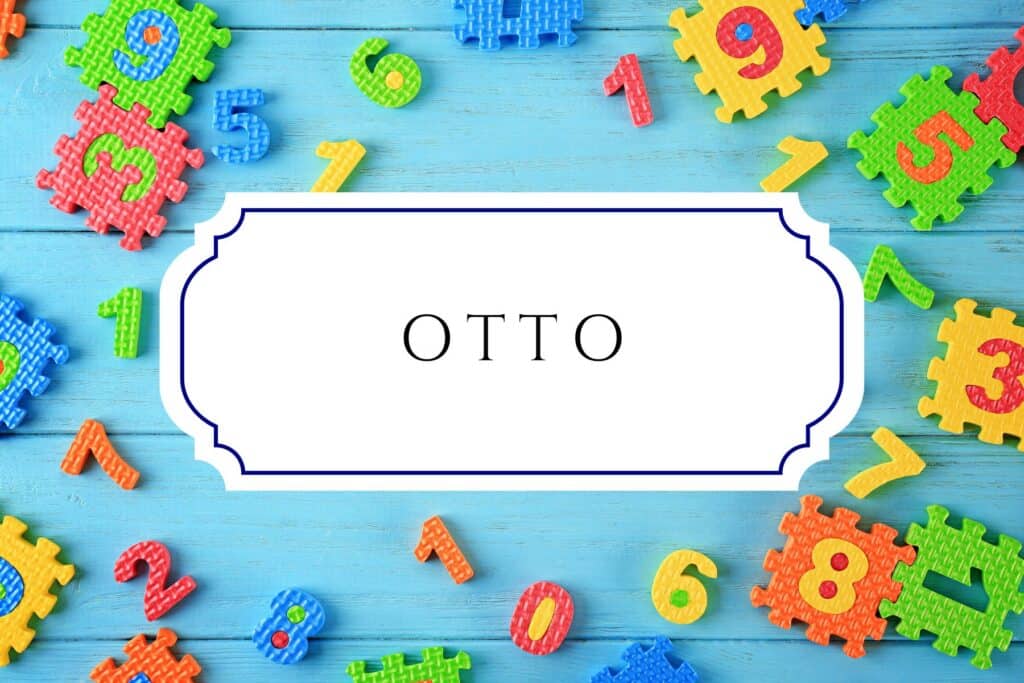
Origin: Italian, Latin
Meaning: Eighth; 8th; Wealth; Prosperity
Otto, pronounced OT-oh, derives from the Germanic element "auda" meaning "wealth, prosperity," but is also considered a diminutive of the Italian baby names Ottavia and Ottavio, meaning “eighth.
8. Vill

Origin: Roman; Invented
Meaning: Eight; 8
Vill, pronounced VIL, represents an inventive name derived from the Roman numeral VIII (8). It would make a great middle name or nickname for other baby names that start with -vil, such as Vilhelm, Vilohit and Villem.
9. Nyne
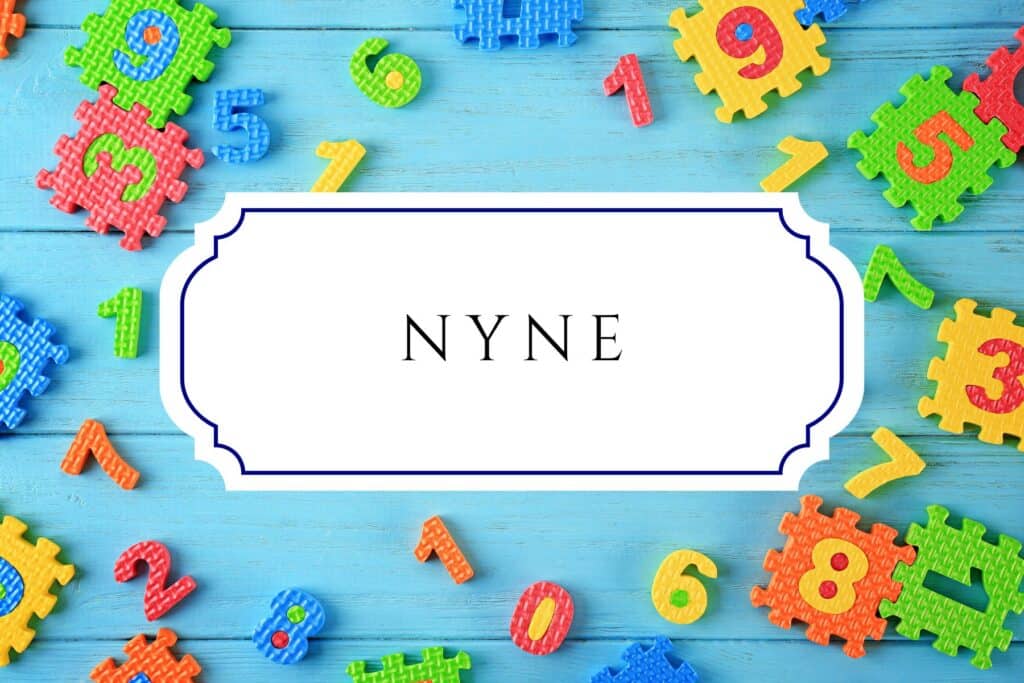
Origin: English; Modern
Meaning: Nine; 9
Nyne, pronounced NINE, is a contemporary stylized spelling of the English word "nine." It’s a great way to honor a son or daughter born on the ninth day of the month or ninth month of the year (September).
9. Nova

Origin: Latin
Meaning: Nine; 9; New
Nova, pronounced NOH-vah, derives from the Latin word "novus," meaning "new," but has numerical significance through its connection to "novem," the Latin word for "nine." It’s where the word November came from, which was the ninth month of the early Roman calendar (now the 11th month).
9. Nona

Origin: Latin, Roman
Meaning: Ninth; 9th
Nona, pronounced NOH-nah, comes from the Latin word "nonus" meaning "ninth." In Roman mythology, Nona was one of the three Parcae (Fates) who specifically presided over the ninth month of pregnancy.
9. Nueve
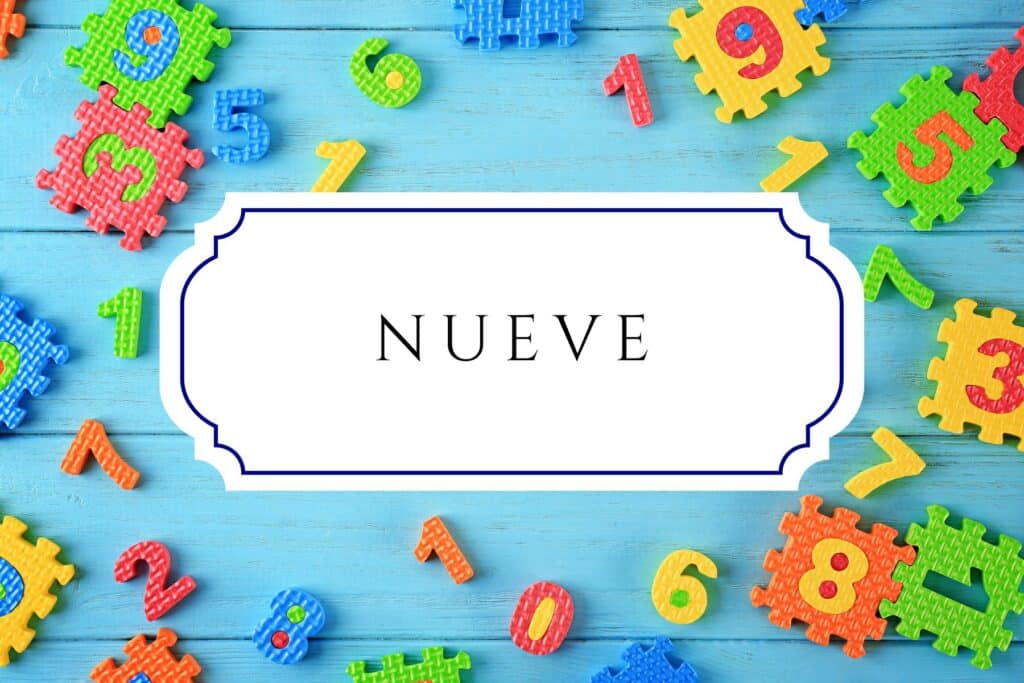
Origin: Spanish
Meaning: Nine; 9
Nueve, pronounced noo-WAY-vay, is simply the Spanish word for "nine." This straightforward name directly represents the number nine in one of the world's most widely spoken languages.
10. Decima
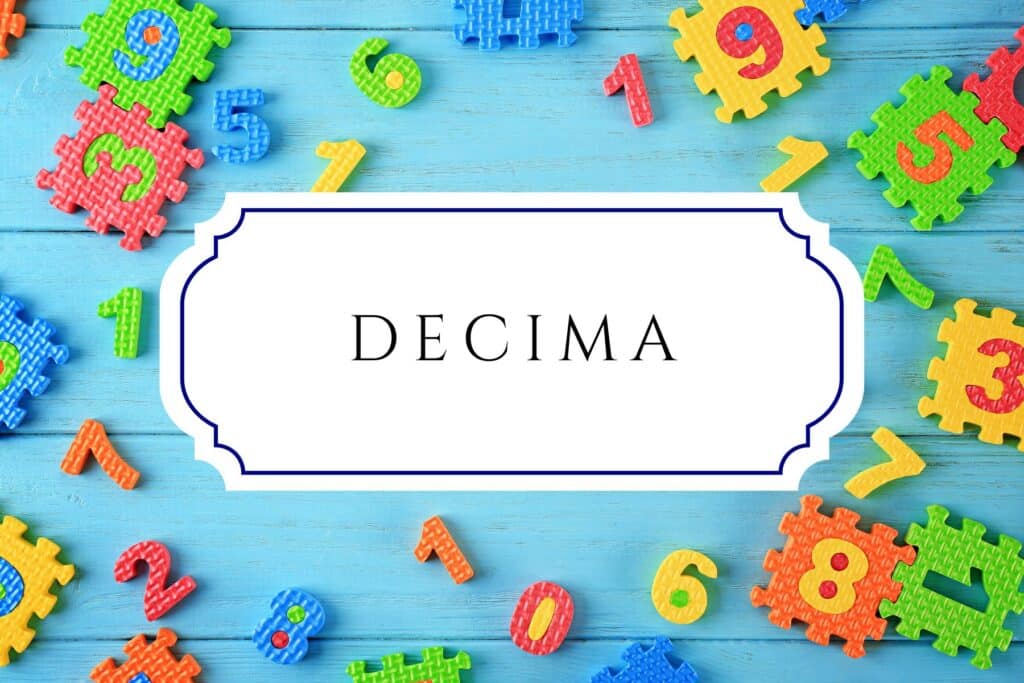
Origin: Latin
Meaning: Tenth; 10th
Decima, pronounced DES-i-mah, derives from the Latin word "decimus" meaning "tenth." In Roman mythology, Decima was one of the three Parcae (Fates) who measured the thread of life.
10. Dixie
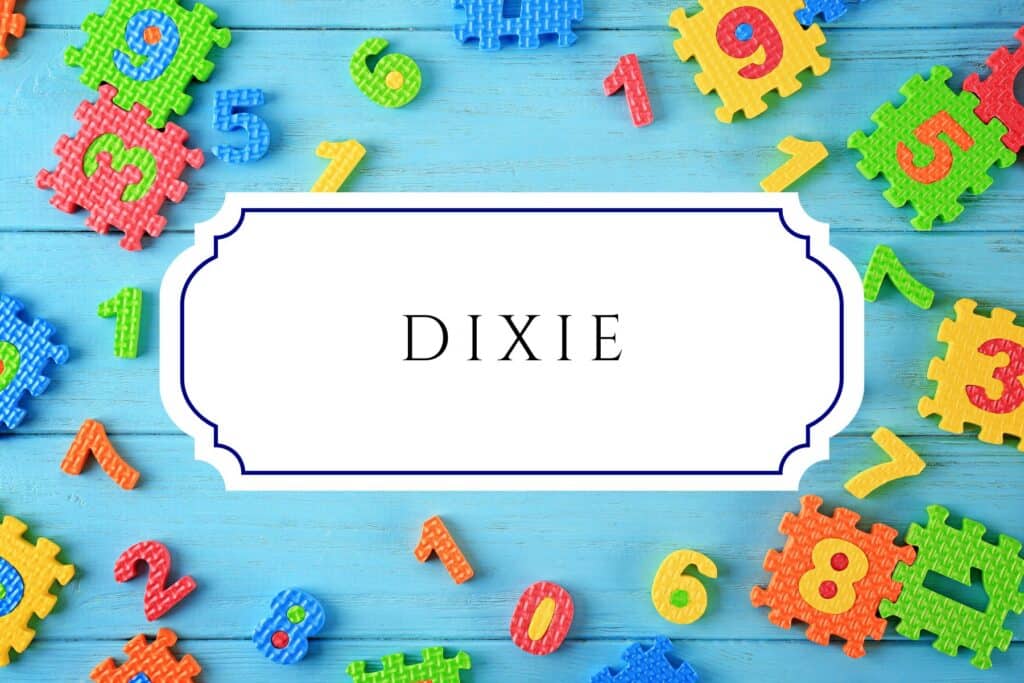
Origin: English; Southern American
Meaning: Tenth; 10th
Dixie, pronounced DIK-see, while most commonly associated with the American South, has a subtle connection to the number ten through the French word "dix," meaning "ten." This connection was reinforced by $10 notes in Louisiana that were labeled with "dix" (French for ten), perhaps leading to the nickname "Dixieland."
10. Diez
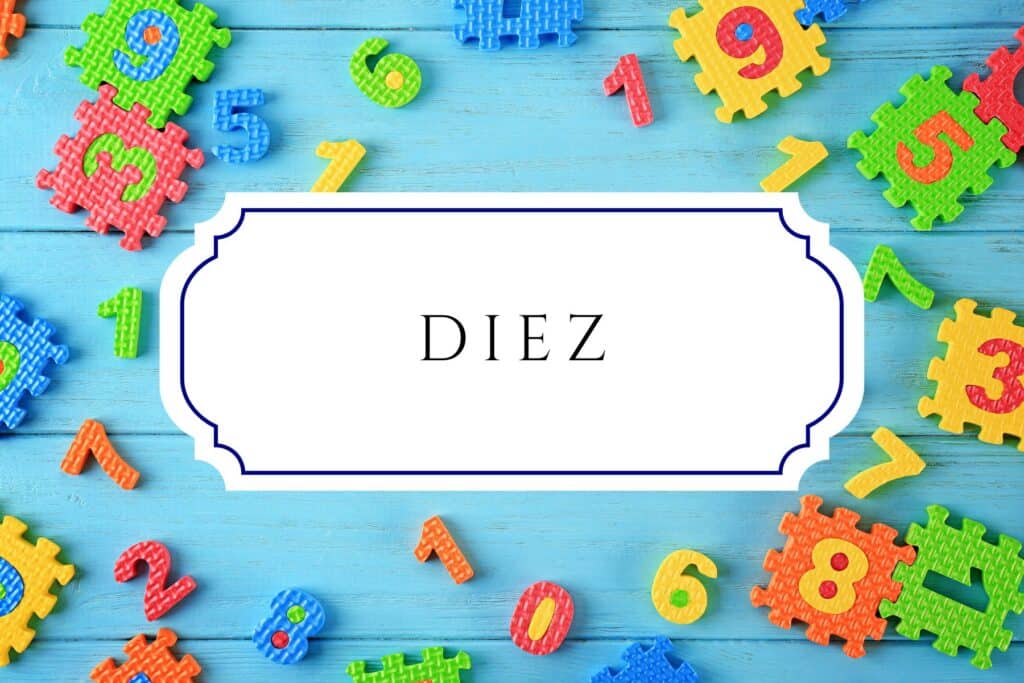
Origin: Spanish
Meaning: Ten; 10
Diez, pronounced dee-EZ, is simply the Spanish word for "ten." Many parents use this as a middle name if their son or daughter was born on the 10th day of the month or 10th month of the year (October).
10. Ashara

Origin: Arabic; Islamic
Meaning: Tenth; 10th
Ashara, pronounced ah-SHAH-rah, derives from the Semitic root "ʿšr" meaning "ten." In Arabic, "ashara" (عشرة) directly translates to the number ten. It’s also closely related to the name Ashura, which refers to the tenth day of Muharram in the Islamic calendar.
11. Eleven

Origin: English
Meaning: Eleven; 11
Eleven, pronounced ih-LEV-in, is directly taken from the English number word for 11. The name gained notable pop culture recognition through the character in the series "Stranger Things," giving it contemporary relevance.
11. Evelyn

Origin: English; Norman French
Meaning: Eleven; 11; Desired; Hazelnut
Evelyn, pronounced EV-uh-lin, while traditionally derived from the Norman French "Aveline" meaning "desired" or "hazelnut," has a coincidental connection to the number eleven through its similar sound to "eleven."
11. Elevyn

Origin: English; Modern
Meaning: Eleven; 11
Elevyn, pronounced eh-LEV-in, is a contemporary stylized spelling of the English word "eleven." It’s perfect if you love the sound of the name Eleven but want to distinguish it from the actual numbe word.
16. Sixten
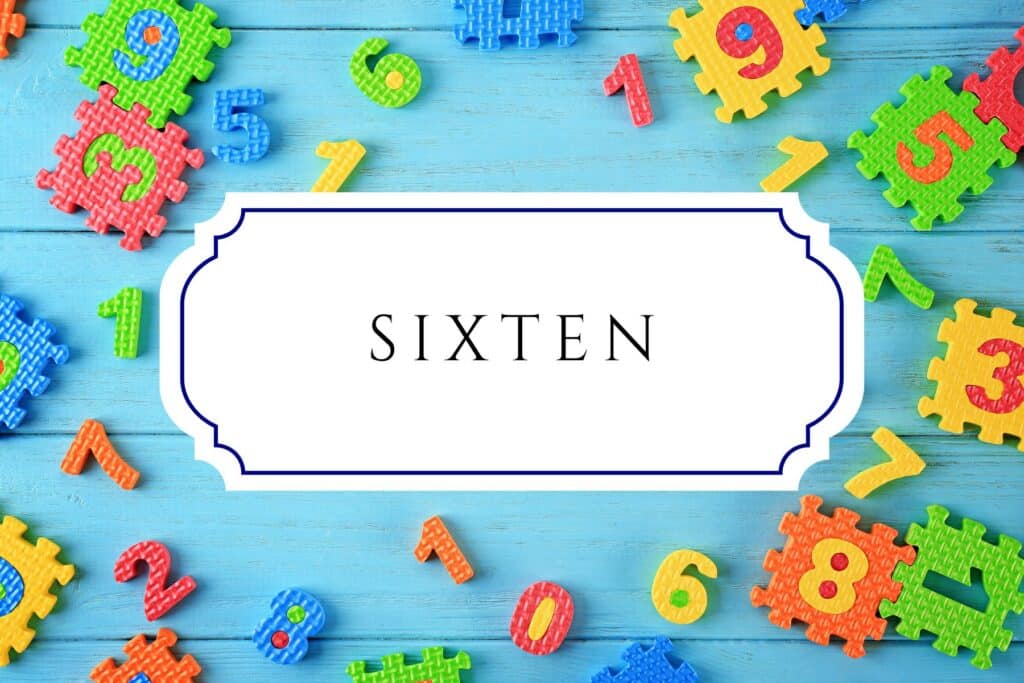
Origin: English, Swedish
Meaning: Sixteen; 16; Victory Stone
Sixten, pronounced SIX-ten, is a combination of the numbers “six” and “ten,” which would equate to “16” or “sixteen.” It’s also a popular Swedish name that combines the Old Norse words "sigr" (victory) and "steinn" (stone).
80. Aydee
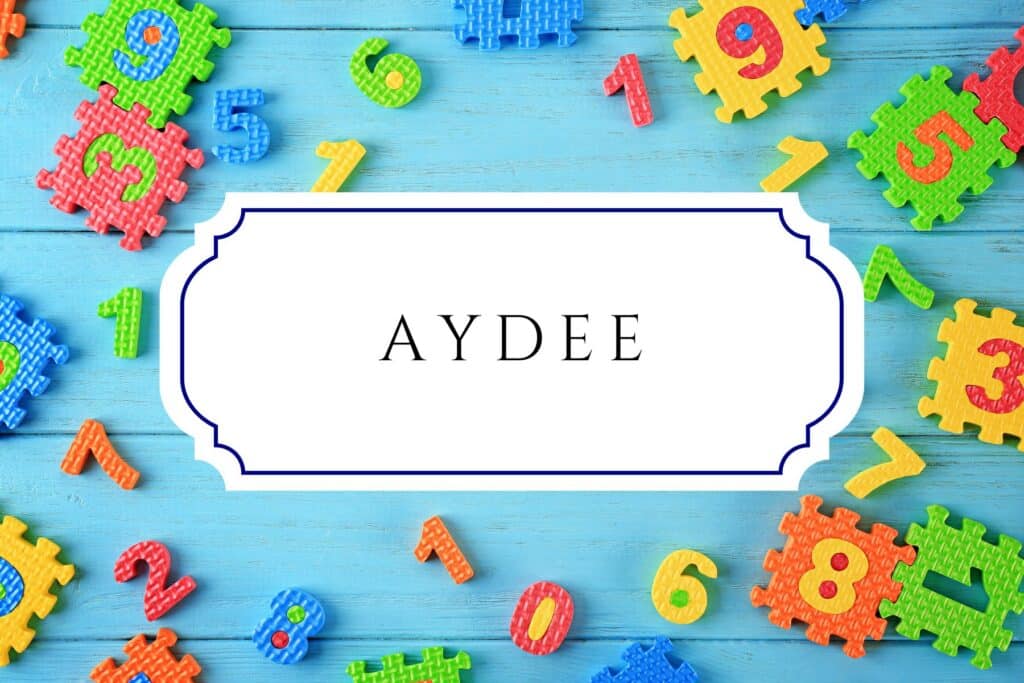
Origin: English; Invented
Meaning: Eighty; 80
Aydee, pronounced AY-dee, is a creative phonetic spelling that sounds like the number 80. While not derived from traditional naming conventions, Aydee offers a modern, innovative approach to numerical naming.
Larger-Than-Life Number Names for Babies

Parents can go big or go home with some larger-than-life number names for babies. For example, the name Millie (popularized by actress Millie Bobby Brown) can be interpreted as a shortened form of the word “million.”
You can also go with the name Billion. Hip-hop artist Rick Ross named his second son Billion Leonard Roberts in 2018, whom he shares with then-girlfriend Briana Camille. Fellow rapper Nick Cannon also jumped on the trend when he named his son Zillion, whom he shares with Abby De La Rosa.
Unlike million and billion, which have specific mathematical values, zillion represents an uncountable vastness and generally translates to “an extremely large, indeterminate number.”
Not feeling the number names trend?
That’s okay, maybe number names for babies just aren’t your thing! The good news is we have plenty more unique (and not-so-unique) baby name ideas for you to sift through at Mod Moms Club!












